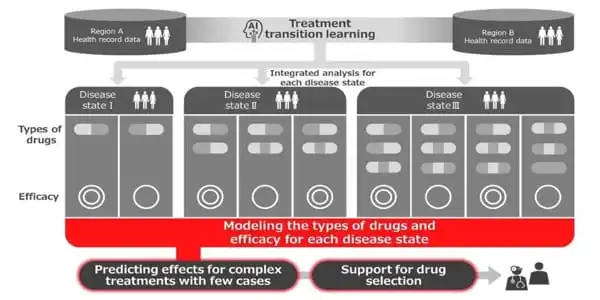The use of machine-learning algorithms and software, or artificial intelligence (AI), to replicate human cognition in the analysis, display, and comprehension of complicated medical and healthcare data is referred to as artificial intelligence in healthcare. AI is the ability of computer algorithms to estimate conclusions solely based on input data.
The major goal of health-related AI applications is to investigate the connections between clinical procedures and patient outcomes. Diagnostics, treatment protocol creation, drug research, personalized medicine, and patient monitoring and care are all areas where AI systems are being used.
Medical researchers created and tested an artificial intelligence (AI) strategy to improve care for patients with type 2 diabetes mellitus who require sophisticated therapy. The new AI system studied electronic health record data from Utah and Indiana to learn generalizable treatment patterns of type 2 diabetic patients with similar characteristics. These patterns can now be utilized to assist establish the best treatment regimen for a particular patient.
Hitachi, Ltd., University of Utah Health, and Regenstrief Institute, Inc. announced today the development of artificial intelligence (AI) technology to improve care for patients with type 2 diabetes who require sophisticated therapy. One in every ten persons globally has type 2 diabetes, but only a small percentage requires numerous drugs to maintain blood glucose levels and avoid significant problems such as vision loss and kidney disease.
Researchers collaborated to create and test a new AI algorithm that evaluated electronic health record data from Utah and Indiana and learned generalizable treatment patterns of type 2 diabetes patients with similar characteristics. These patterns can now be utilized to assist establish the best treatment regimen for a particular patient.
Physicians may have inadequate clinical decision-making skills or evidence-based guidelines for choosing prescription combinations for this smaller group of patients. The solution is to increase the number of patients in order to facilitate the establishment of general principles to guide decision-making. Combining patient data from numerous healthcare institutions, on the other hand, necessitates extensive knowledge of artificial intelligence (AI) and extensive experience constructing machine learning models using sensitive and complex healthcare data.
Researchers from Hitachi, the University of Utah Health System, and Regenstrief collaborated to create and test a new AI algorithm that evaluated electronic health record data from Utah and Indiana and learned generalizable treatment patterns of type 2 diabetes patients with similar characteristics. These patterns can now be utilized to assist establish the best treatment regimen for a particular patient.
Some of the study’s findings have been published in the peer-reviewed medical journal Journal of Biomedical Informatics in the paper “Predicting pharmacotherapeutic outcomes for type 2 diabetes: An evaluation of three approaches to utilizing electronic health record data from diverse sources.”

For some years, Hitachi had been collaborating with U of U Health on the creation of a medication selection system for diabetes treatment. However, due to a lack of data, the algorithm was not always able to reliably forecast more complex and uncommon treatment patterns. Furthermore, it was difficult to use data from numerous institutions since it was important to account for changes in patient disease statuses and treatment medicines provided between facilities and geographies. To solve these issues, the group collaborated with Regenstrief to augment the data it was working with.
The novel AI system first combines individuals with comparable illness conditions before analyzing their treatment patterns and clinical results. It then links the patient of interest to disease state groups and predicts the patient’s range of potential outcomes based on various treatment options. The researchers assessed how well the technique predicted successful outcomes based on treatment regimens administered to diabetic patients in Utah and Indiana. Even when two or more drugs were used concurrently, the algorithm was able to support medication selection for more than 83 percent of patients.
In the future, the study team hopes to assist individuals with diabetes who require sophisticated therapy in determining the efficacy of various drug combinations and then decide on a treatment plan that is best for them in collaboration with their doctors. This will result in improved diabetes control as well as greater patient engagement, compliance, and quality of life.
The three parties will continue to analyze and improve the new AI method’s effectiveness, as well as contribute to future patient care through additional healthcare informatics research.
Through collaboration between its healthcare and IT business divisions, as well as its R&D organization, Hitachi will expedite efforts, including the practical use of this technology. GlobalLogic Inc., a Hitachi Group Company and a leader in Digital Engineering, is promoting healthcare-related initiatives in the United States, and this relationship will be expanded. The entire Hitachi group will contribute to people’s health and safety as a result of these initiatives.





